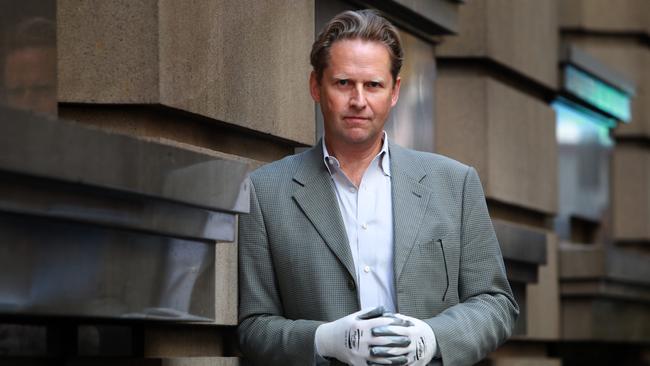Covid’s here to stay, says Ansell boss Magnus Nicolin
Ansell’s outgoing chief executive, Magnus Nicolin, says Covid-19 will be around for the rest of our lives.

Ansell’s outgoing chief executive, Magnus Nicolin, says Covid-19 will be around for the rest of our lives and will eventually become relatively benign like seasonal flu — provided people get vaccinated.
But, so far, he does not believe in mandating immunisation to achieve that goal. Instead he prefers encouraging the company’s 14,000 staff to get the jab and herald a return to some kind of normality.
Compulsorily vaccinations are emerging as one of the biggest industrial battlegrounds this year as the world struggles to contain the highly infectious Delta variant of the virus, with Australian companies including SPC, Qantas and Healthscope introducing mandatory shots to protect their workforce and customers.
Mr Nicolin said Ansell had been weighing up compulsory vaccination, with the Delta variant shutting down its manufacturing in Vietnam and curtailing operations in Malaysia, Thailand and Sri Lanka. Buts it's a step that he believes is not yet necessary for Ansell to take.
“This is a big debate in many countries around the world: can you mandate, can you force somebody to inject something into their body that they don‘t want to do?” Mr Nicolin said.
“I think it’s questionable for you to do that. We may come to that because it’s the only way out. But for now as a company, we’ve not been issuing mandates. It’s a tough call.”
It comes as Covid-19 has heightened awareness for personal hygiene and protection — a trend Ansell recognised at the onset of the pandemic last year — and has been spending big to ensure its dominance as the world leader in personal protective equipment.
It hiked up capital expenditure 36.5 per cent to $US82.7m ($114m) in the year to June 30, introducing a dozen new lines, allowing production to quadruple in some areas to meet demand. The company is expecting spending would remain high throughout 2022.
“Unfortunately, Covid-19 will be around a year from now and two years from now and some epidemiologists are even saying we’re going to have to live with this for the rest of our lives,” Mr Nicolin said.
“It‘s going to be benign, we’ll find the right vaccines for it so that it’s going to be more like a flu, but it’s not going to go away.”
His comments echo NIB chief executive Mark Fitzgibbon who said on Monday that eradicating Covid-19 was nonsense, particularly given the world is yet to stamp out bubonic plague after 700 years.
Meanwhile, the Business Council of Australia is calling on lockdowns to be confined to the past permanently once national vaccination rates hit 80 per cent.
On and off lockdowns, and subsequent bans on elective surgery, initially played havoc on Ansell’s surgical gloves division. But Mr Nicolin said the company was able to sell more of the protective gloves into emergency departments, with the division managing to grow 6.9 per cent. He predicted demand would stay strong, with some countries expected to take years to clear their elective surgery backlogs.
“In the UK we have year long or multi year long queues to get routine surgical procedures done, and they haven‘t been able to take those cues down much in the last six months,” Mr Nicolin said.
“So I suspect that we‘re going to see a strong demand for surgical gloves for years to come as healthcare systems around the world push hard to eat into those long waiting lines.
“That‘s part of the reason why we’ve been so bullish in investing in more capacity and continue to invest in more capacity for surgical gloves. We’ve also converted a lot of big accounts and taking market sharing in the US, in Europe and Japan and India and various places, so it’s a strong business and we’re in pole position, hopefully.”
Overall, group net profit soared 58 per cent to $US247.7m. Meanwhile, revenue leapt 25.6 per cent to $US2.03bn. It followed the company upgrading its profit forecast three times throughout the year.
But its shares dived 9.2 per cent to $36.78. Citi analyst John Deakin-Bell said the company’s earnings per share of 192.2 US cents was 3 per cent below consensus on lower margins.
“Given the extreme volatility from Covid, we expect the market likely to focus more on FY22 than the FY21 result which was pre-guided. However, the detail of FY21 was: EBIT (earnings before interest and tax) of $US338m was 4 per cent below consensus of $US354m, revenue of $US2.03bn was 1 per cent above consensus and benefited from foreign exchange,” Mr Deakin-Bell wrote in a note to investors.
“Ansell faces significant earnings risk from currency movements (particularly EUR-USD) and key raw material inputs. Raw materials such as latex form a high proportion of costs and are highly volatile and difficult to forecast.”
Mr Nicolin said the company would also spend more on software, a portion of which will be “immediately expensed” rather than capitalised and amortised. This will likely wipe 5-6 US cents of Ansell’s earnings per share, which is expected to be between 175-195 US cents versus 192.2 US cents in the year to June 30.
But Mr Nicolin said Ansell remained well positioned.
“The company is now a stronger and larger global PPE (personal protective equipment) sector leader with enviable manufacturing, marketing and innovation capabilities thoroughly tested by the extraordinary circumstances of our times,” he said.
The company will pay its final dividend of US43.6c on September 16.




To join the conversation, please log in. Don't have an account? Register
Join the conversation, you are commenting as Logout